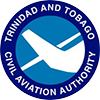Unmanned Aircraft Systems
The term ‘Unmanned Aircraft (UA)’ refers to an aircraft (or drone) without an on-board human pilot while an ‘Unmanned Aircraft System (UAS)’ refers to the actual aircraft together with its associated components such as a ground control station and the communication data link. This UAS is also known as a ‘Remotely Piloted Aircraft System (RPAS)’. The UAS originated to serve as a tool within a country’s military arsenal however it has been adapted for civil use – within the last 15 years, the number of UAS and type of uses grew exponentially. Trinidad and Tobago has also experienced this growth.
In 2015, the TTCAA was tasked with providing an oversight on the use of UAS in Trinidad and Tobago. Consequently, there was the drafting and implementation of laws, regulations and guidelines to achieve such task. In 2016, the Civil Aviation [(No. 19) Unmanned Aircraft Systems] Regulations were passed by Parliament and pertinent regulatory oversight of these UAS began.
The TTCAA began offering the following UAS services;
· UAS Registration – This registration is based on the characteristics of the UAS, particularly the weight and the speed of the UAS. It is mandatory for all UAS with a maximum take- off mass (MTOM) of 750g or more and a speed of 40m per second or more to be registered. It is optional to register a Category 1 (a UAS weighing less than 750). Sometimes, the UAS may be registered based on its intended use or type of operator. All foreign operators are required to meet with the TTCAA prior to any recreational or commercial operations in T&T. The registration process consist of attending a virtual webinar and completing a fillable form. For more information, contact us at drones@caa.gov.tt; and
· UAS Approval – Prior to conducting any operation that is in violation of the Civil Aviation [(No. 19) Unmanned Aircraft Systems] Regulations or activities that are deemed ‘commercial operations’, the UAS operator is required to seek approval from the TTCAA and all other necessary Governmental and non-Government stakeholders. For example, operating in No Fly Zones (NFZ), operating over persons, public property etc. This Request for Approval shall be accompanied by a letter consisting of the details of the operations – coordinates/location, time, duration, altitude etc. As well as a Letter of Indemnity and Proof of Insurance. For more information, contact us at drones@caa.gov.tt.
If there are any additional, comments, concerns and queries, please feel free to reach out. If you are ready to fly, be sure to visit No Fly Zones Webmap to determine whether your operations will fall within a No Fly Zone.

Trinidad and Tobago Civil Aviation Authority
"Provision of a Regulatory Framework to facilitate a Safe, Secure and Effective Aviation Industry and Air Navigation Services within the Piarco Flight Information Region"
- Contact: 669-4302
- Email: ttcaa@caa.gov.tt
- Website: www.caa.gov.tt

Official Business Hours: Administrative and
Regulatory Sections: Mondays – Thursdays: 8:00am to 4:15pm Fridays: 8:00am to 4:00pm
Closed on Weekends, Public Holidays and after business hours. · Air Navigation Services Operations: 24 hour Service every day including Public Holidays.